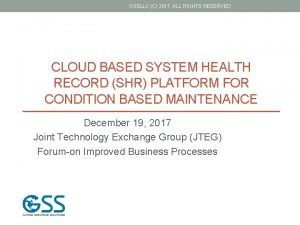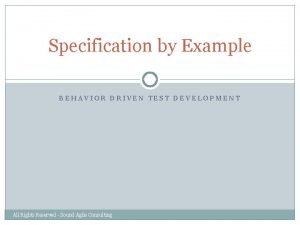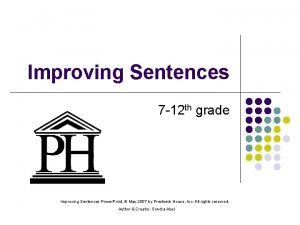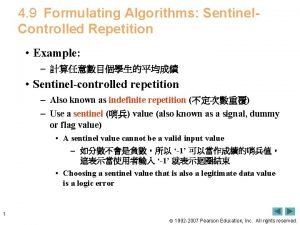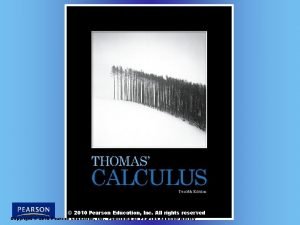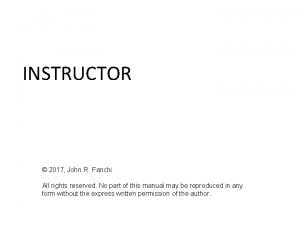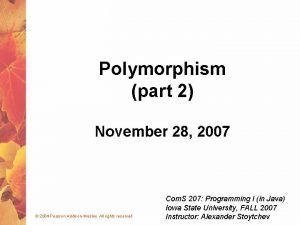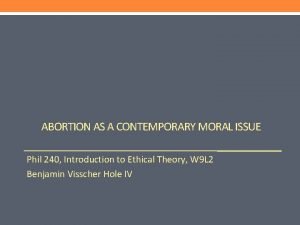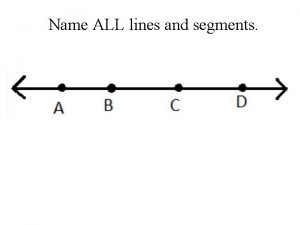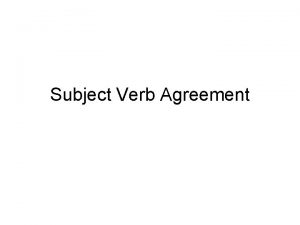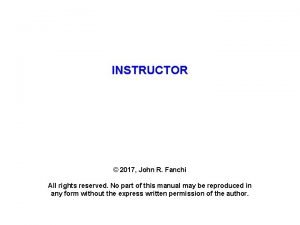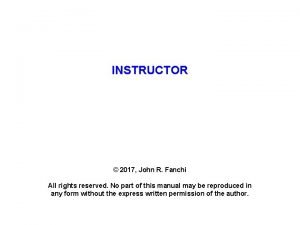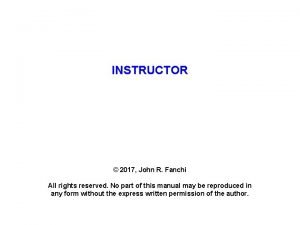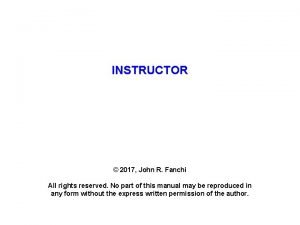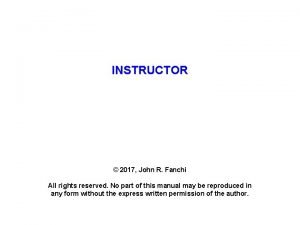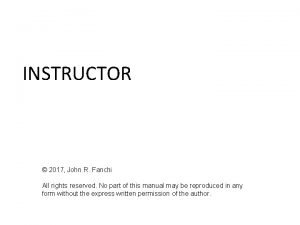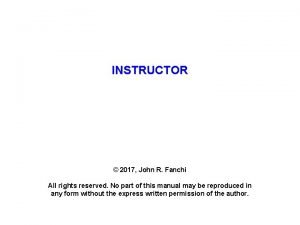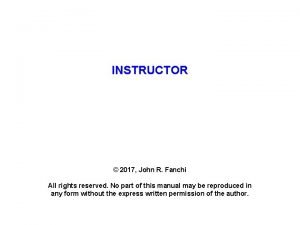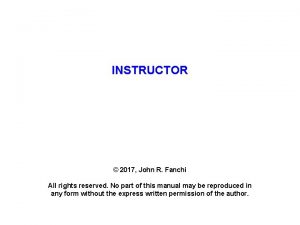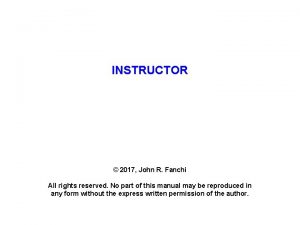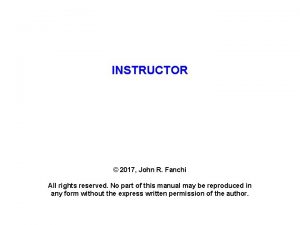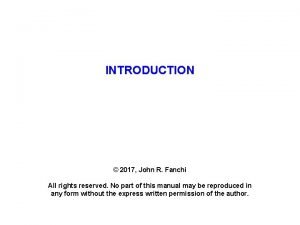INSTRUCTOR 2017 John R Fanchi All rights reserved










































- Slides: 42

INSTRUCTOR © 2017, John R. Fanchi All rights reserved. No part of this manual may be reproduced in any form without the express written permission of the author.

To the Instructor The set of files here are designed to help you prepare lectures for your own course using the text Introduction to Petroleum Engineering, J. R. Fanchi and R. L. Christiansen (Wiley, 2017) File format is kept simple so that you can customize the files with relative ease using your own style. You will need to supplement the files to complete the presentation topics.

PERMEABILITY © 2017, John R. Fanchi All rights reserved. No part of this manual may be reproduced in any form without the express written permission of the author.

Outline Ø Darcy’s Law and Permeability Ø Permeability Averaging Ø Transmissibility Ø Measures of Permeability Heterogeneity Ø Darcy’s Law with Directional Permeability

DARCY’S LAW AND PERMEABILITY

Henri Darcy (1856) Empirical fit of water flow through packed sand Observation Flow rate proportional to pressure gradient Assumptions: 1. Single phase water 2. Homogeneous sand 3. Vertical flow 4. Non-reactive fluid 5. Single geometry

Darcy’s Law – Horizontal A Q P 1 L P 2 q = Flow rate k = Proportionality constant A = Cross-sectional area μ = Fluid viscosity p = Pressure L = Length or distance of flow Integrate assuming constant q, k, A, μ:

Permeability Defined Darcy’s Law q Fluid flow rate of 1. 0 cc/sec Fluid viscosity of 1. 0 cp A Sample cross-sectional area of 1. 0 cm 2 L Sample length of 1. 0 cm Δp = p 1 - p 2 = Pressure gradient of 1. 0 atm k Permeability of 1. 0 darcy

Permeability Dimensional Analysis Permeability unit is “length squared” or “area”

Permeability Interpretation Ø Permeability describes flow in a given sample for given fluid and set of experimental conditions Ø Permeability may be viewed as mathematical convenience Ø Describes statistical behavior of given flow experiment Ø Permeability has meaning as statistical representation of a large number of pores

Tortuosity Area Grain H Pore Flow Path B Flow Path A

Actual vs. Apparent Velocity Apparent velocity = velocity of fluid flowing through linear conduit Actual Velocity = velocity of fluid flowing through tortuous path Note: Vact > Vapp

Poiseuille’s Equation: calculate flow q through n cylindrical capillary tubes of radius r and length L Where Atube = π r 2 In Darcy’s Law, flow in a core can be approximated by: Equating Poiseuille’s eq and Darcy’s law gives - k relationship:

ϕ-k from Poiseuille’s Equation - k relationship from Poiseuille’s eq and Darcy’s law: Permeability = k, ft 2 Number of tubes = n Radius of tube = r, ft Cross-sectional area of core = A, ft 2 Perm Conversion factors: 1 md = 0. 986923 × 10 -15 m 2 = 1. 06 × 10 -14 ft 2

Darcy’s Law for a Core Darcy’s law Volumetric flow rate = q, bbl/day Permeability = k, md Cross-sectional area of core = A, ft 2 Viscosity = μ, cp Pressure change across core = Δp, psia Length of core = L, ft

Examples of Permeability Porous Medium Coal Shale Loose sand (well sorted) Partially consolidated sandstone Consolidated sandstone Tight gas sandstone Limestone Diatomite Permeability 0. 1 to 200 md <0. 005 md 1 to 500 md 0. 2 to 2 d 0. 1 to 200 md < 0. 01 md 0. 1 to 200 md 1 to 10 md

Qualitative Permeability Ranges Range (md) Description ≈ 10 -6 Shale (nanodarcy) ≈ 10 -3 Tight (microdarcy) 1 – 10 Low (millidarcy) 10 – 250 Moderate > 250 High

Factors Affecting Permeability 1. Packing of grains 2. Rock texture 3. Grain size distribution 4. Angularity 5. Cementation 6. Rock compaction

Methods of Estimating K 1. Well Test Analysis 2. Well Logs 3. Core Experiments 4. Statistical Correlations 5. Simulation Methods Note the scale of measurement and the “directness” of each approach.

Direct Measurement vs. Correlation Ø Well test analysis assuming Darcy flow. Ø Measurement scale is effective drainage area. Ø Well Logs assume various correlations. Ø Measurement scale is inches to feet. Ø Core analysis is the most “direct”, although correlation takes place. Ø Measurement scale is inches. Ø Statistical Methods: neural networks and geostatistics blend information. Ø Inexact science. Ø Simulation: Attribute an effective perm at a coarse scale.

PERMEABILITY AVERAGING

Flow Through Beds in Parallel Arithmetic average

Flow Through Beds in Series Harmonic average

TRANSMISSIBILITY

Flow Between Blocks Series application of Darcy’s Law for neighboring blocks

Transmissibility Estimate flow rate between blocks with Darcy phase transmissibility between blocks

MEASURES OF PERMEABILITY HETEROGENEITY

Heterogeneity and Anisotropy Homogeneous (no special place) Isotropic (no special direction)

HETEROGENEITY MEASURES Heterogeneity: Spatial variability of permeability DYKSTRA-PARSONS COEFFICIENT (SPE 20156, Lake and Jensen, 1989) LORENZ COEFFICIENT (SPE 20156, Lake and Jensen, 1989)

DYKSTRA-PARSONS COEFFICIENT (SPE 20156, Lake and Jensen, 1989) Estimate for log normal permeability distribution Where k. A = arithmetic average And k. H = harmonic average Range: 0 VDP 1 Homogeneous Reservoir: VDP = 0 (in this case, KA = KH) Increasing heterogeneity increases VDP Typical Reservoir Values: 0. 4 VDP 0. 9

LORENZ COEFFICIENT (SPE 20156, Lake and Jensen, 1989) Plot cum flow capacity Fm vs cum thickness Hm where for n = number of reservoir layers. Arrange layers in order of decreasing permeability Thus I=1 has thickness h 1 and the largest perm k 1 While I=n has thickness hn and the smallest perm kn By Definition, 0 Fm 1 and 0 Hm 1 for 0 m n

THE LORENZ CURVE Lorenz curve 1. 0 C B Fm 0. 0 A Hm 1. 0 The Lorenz coefficient LC is 2*Area between the Lorenz curve ABC in the figure and the diagonal AC.

PROPERTIES OF THE LORENZ COEFFICIENT Ø Ø Range: 0 LC 1 Homogeneous Reservoir: LC = 0 Increasing heterogeneity increases LC Typical Reservoir Values: 0. 2 LC 0. 6

ESTIMATING THE LORENZ COEFFICIENT Assume all perms have equal probability and use trapezoidal rule to estimate area, thus Ordering of perm is not necessary with this estimate. Note: if ki = kj (homogeneous case), then LC = 0.

DARCY’S LAW WITH DIRECTIONAL PERMEABILITY

Directional Permeability Ø Permeability may depend on direction Ø Vertical perm (kz, perpendicular to bedding plane) often about 1/10 horizontal perm (kx, ky, parallel to bedding plane) Ø Reservoir simulators typically use diagonalized tensor Ø Permeability may be heterogeneous kz kx ky

Anisotropy and Flow A. Isotropic (Kx = Ky) B. Anisotropic (Kx ≠ Ky)

DARCY’S LAW AND PHASE POTENTIAL Darcy’s Law for single phase flow in 1 -D: Phase Potential of phase i:

3 -D EXTENSION OF DARCY’S LAW Permeability Tensor

PRINCIPAL AXES Coordinate system {x’, y’, z’} Typically assume diagonalized tensor aligned with principal axes y Coordinate Rotation x' y' θ x

QUESTIONS?

SUPPLEMENT
 Gssllc
Gssllc Specification by example
Specification by example Copyright 2015 all rights reserved
Copyright 2015 all rights reserved All rights reserved sentence
All rights reserved sentence Creative commons vs all rights reserved
Creative commons vs all rights reserved Confidential all rights reserved
Confidential all rights reserved All rights reserved example
All rights reserved example Copyright 2015 all rights reserved
Copyright 2015 all rights reserved Pearson education inc all rights reserved
Pearson education inc all rights reserved Microsoft corporation. all rights reserved.
Microsoft corporation. all rights reserved. Microsoft corporation. all rights reserved
Microsoft corporation. all rights reserved Microsoft corporation. all rights reserved
Microsoft corporation. all rights reserved Pearson education inc. all rights reserved
Pearson education inc. all rights reserved Dell all rights reserved copyright 2009
Dell all rights reserved copyright 2009 Warning all rights reserved
Warning all rights reserved All rights reserved c
All rights reserved c All rights reserved formula
All rights reserved formula Warning all rights reserved
Warning all rights reserved Confidential all rights reserved
Confidential all rights reserved Microsoft corporation. all rights reserved
Microsoft corporation. all rights reserved 2010 pearson education inc
2010 pearson education inc Copyright © 2018 all rights reserved
Copyright © 2018 all rights reserved Pearson education inc all rights reserved
Pearson education inc all rights reserved Pearson education inc. all rights reserved
Pearson education inc. all rights reserved Confidential all rights reserved
Confidential all rights reserved Airbus deutschland gmbh
Airbus deutschland gmbh R rights reserved
R rights reserved Rights reserved
Rights reserved Positive vs negative rights
Positive vs negative rights Littoral rights definition
Littoral rights definition Duties towards self
Duties towards self Legal rights and moral rights
Legal rights and moral rights What is negative right
What is negative right Negative right
Negative right Positive rights vs negative rights
Positive rights vs negative rights Positive rights and negative rights
Positive rights and negative rights Name 3 points
Name 3 points Tipos de participantes y sus características
Tipos de participantes y sus características Tcole instructor course
Tcole instructor course Basic instructor course texas
Basic instructor course texas Basic instructor course texas
Basic instructor course texas Pepperball launcher nomenclature
Pepperball launcher nomenclature Neither of my two suitcases are adequate for this trip
Neither of my two suitcases are adequate for this trip
